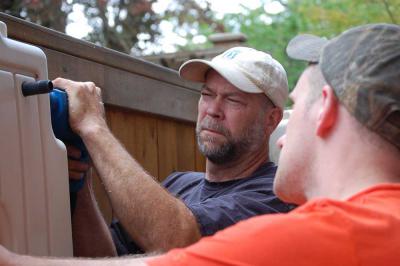
Lane Community College’s water conservation technician program — one of only a few like it in the country — hasn’t had enough students to fill a cohort since 2012.
The college is still offering it — though enrollment is zero — because skills in water conservation may soon be in demand as communities reassess how they think about water, in part due to drought.
It’s part of LCC’s balancing act, accommodating fluctuating enrollment and keeping up with the latest employment trends, all while staying committed to sustainability.
Roger Ebbage, water conservation program manager at LCC, says one reason for low enrollment in the program is the improving economy. “People are back working,” he says. “Community colleges thrive during recessions.”
This is part of a larger trend: Each of the past two years, total enrollment has declined 10 percent, according to data from the college.
But Jill Hoyenga, a planner with EWEB, says jobs are there, and more will open up.
“The need has been there for 20 years [for water conservation],” she says, but only now the public is becoming aware of it.
“There’s a need for a lot of creative-minded folks to help with solutions we haven’t yet begun to investigate,” she says, citing the example of smart sprinklers, which can be adjusted with a smart phone to accommodate slight fluctuations in weather.
But students interested in this field would likely have to relocate. Mark Taratoot, water resources specialist for Corvallis Public Works, says Eugene, Corvallis and other cities have focused on water conservation for years, so they already have people working on it. “I think the jobs are there, but they’re filled,” he says.
Other parts of the country, however, are still catching up, and Taratoot says that’s where the money and the jobs should be. “If you go to Phoenix, Denver or some place where water is very expensive,” he says, “the amount of money they can spend on conservation goes up.”
Brian Kelly, vice president of college services at LCC, says he believes the program will fill again in the near future. “I still think we’re ahead of the game,” he says. “I don’t think people are thinking of that as a career.”
Last year, the college cut two programs — electronics and auto body repair — but added seven where new jobs are projected to be.
“We need to be agile,” Kelly says. “Our responsibility to the community is to put out relevant programs.”
And it seems like few things are as relevant now as water conservation, with signs of water shortages spreading. The AP reports that giant sequoias in California are showing signs of stress due to drought. Junction City and Oakridge imposed water restrictions this summer.
Ebbage says he’s not sure why he has received only a handful of applications. “We were teaching this stuff before it was on anyone’s radar,” he says. “Now it’s on everyone’s radar.”